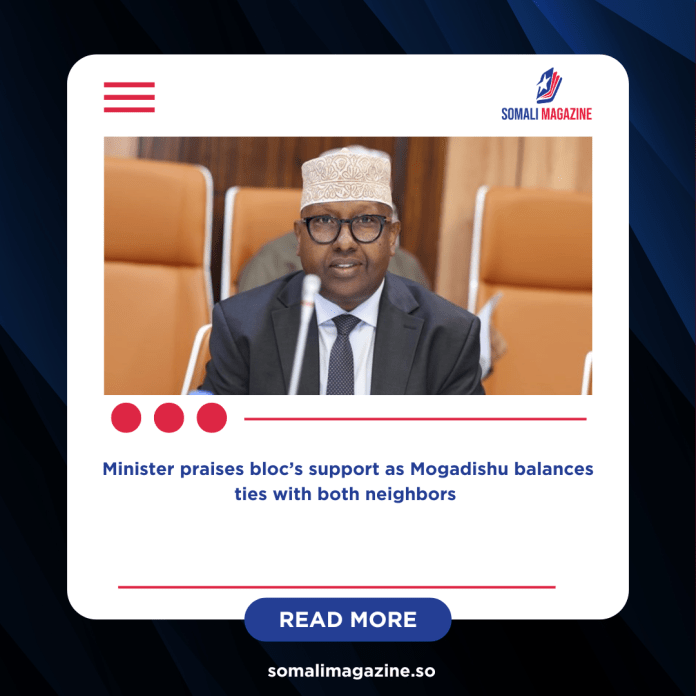Facebook Twitter (X) Instagram Somali Magazine - People's Magazine
Somalia’s Defence Minister, Ahmed Moalim Fiqi, has spoken out in defense of the Arab League after Ethiopia accused the bloc of siding with Egypt in the long-standing dispute over the Nile River and the Grand Ethiopian Renaissance Dam (GERD).
Fiqi highlighted the Arab League’s importance in promoting cooperation among member states and protecting their sovereignty. He emphasized that Somalia deeply values the League’s consistent support, especially as the country continues its fragile journey of rebuilding state institutions after years of instability.
In a statement posted on X, formerly Twitter, Fiqi said Somalia’s membership in the Arab League is integral to its diplomatic and developmental progress. He expressed gratitude for the League’s “unwavering support” to Somalia, noting that its main goal has always been to strengthen ties among members and coordinate efforts to safeguard their independence and stability.
The minister’s defense came shortly after Ethiopia’s ambassador to Somalia, Suleyman Dedefo, launched sharp criticism against the Arab League. The envoy accused the organization of serving Egypt’s foreign policy interests rather than acting as a neutral body. According to Dedefo, the Arab League consistently rejects Ethiopia’s stance on the Nile issue while turning a blind eye to humanitarian crises unfolding in some Arab countries.
The Nile dispute centers on Ethiopia’s $5 billion Grand Ethiopian Renaissance Dam, Africa’s largest hydroelectric project. Ethiopia has been pressing ahead with construction and filling of the dam despite objections from Egypt and Sudan, both of which depend heavily on the Nile’s waters. Egypt has long argued that the GERD poses a direct threat to its water security, describing the project as an existential issue. On the other hand, Ethiopia insists it is exercising its sovereign right to harness its natural resources for development and to generate electricity for millions of its citizens.
Ambassador Dedefo dismissed Egypt’s fears as baseless and made it clear that Ethiopia would not stop building dams along the Nile. He further argued that Egypt’s attempts to block Ethiopia’s progress had already failed and would not succeed in the future. His comments underscore the growing rift between Ethiopia and Egypt, which has been at the heart of regional tensions for over a decade.
The Arab League, for its part, has repeatedly sided with Egypt and Sudan in demanding that Ethiopia enter into a legally binding agreement over how the dam is filled and operated. In its most recent statement, the bloc condemned Ethiopia’s decision to move forward with GERD without securing such a deal, stressing that unilateral action undermines regional stability.
Somalia now finds itself in a delicate position. On one side, it benefits from its close ties with the Arab League, which provides political backing and financial support at a critical stage in its state-building process. On the other side, Ethiopia is a powerful neighbor and an essential security partner in the Horn of Africa, particularly in joint efforts to combat extremist groups such as al-Shabaab.
Balancing these relationships will not be easy for Somalia. Supporting the Arab League risks straining relations with Ethiopia, while distancing itself from the bloc could weaken its standing among Arab states and reduce vital support. Fiqi’s remarks reflect this balancing act, showing Somalia’s desire to maintain its loyalty to the Arab League while avoiding a direct confrontation with Ethiopia.
The ongoing GERD dispute continues to ripple across the region, drawing in different countries and alliances. For Somalia, navigating this complex diplomatic terrain will be crucial in protecting its own interests without alienating either side.

